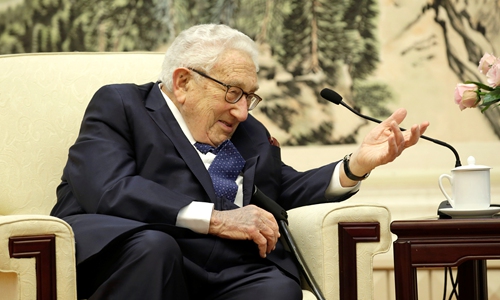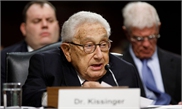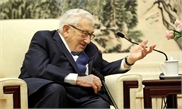
Henry Kissinger Photo: VCG
Zheng Yongnian, acting dean of the School of Humanities and Social Science at the Chinese University of Hong Kong (Shenzhen), recently raised a new concept when analyzing US strategy toward China. He named it "post-Kissinger mind-set." According to Zheng, the US tends to believe Russia is only a troublemaker for the US, rather than a real threat like China. Therefore, he explains that a "post-Kissinger mind-set" has started to take root in Washington, which aims at turning the China-US-Russia triangle into a new China-US-India triangle - further roping New Delhi in to contain Beijing.Former US secretary of state Henry Kissinger has played a prominent role in US foreign policy and is a master when it comes to the balance-of-power theory. During the Cold War era, he promoted the opening of diplomatic relations with China to gain leverage over the Soviet Union.
A simple summary of this tactic: forging an "alliance" with one party to jointly confront the third. Based on the logic, there is not much difference between US cozying up to China to create a balance against the Soviet Union in the past, and Washington drawing New Delhi over to gang up against Beijing today. They basically mean the same thing - so one can hardly say there is a "post-Kissinger mind-set."
Moreover, India can hardly replace Russia's role as a major pole in the world order. Thus, forging a China-US-India triangle to replace the China-US-Russia triangle in terms of world pattern is unlikely.
Since the US has taken China as its "greatest threat," drawing India into its camp has become one of the primary US agendas. Yet there are some stumbling blocks on the way. India faces numerous challenges and complex contradictions at home. Its currently surging coronavirus cases is proof of many difficulties the country is being confronted with when it come to domestic governance. If the US treats India as a crucial strategic partner with geopolitical games, some observers are concerned India may become a negative asset most of the time.
India, on the other hand, is also resistant to forging a real alliance with the US. Of course, New Delhi over recent years seems to have been deviating from its nonaligned policy. However, India still believes it is a major power, and becoming an ally of the US is incompatible with India's international image. Worse, neither side has firm faith in the other. They both doubt if the other is totally reliable.
Forging a China-US-India triangle, like the previous power structure among China, Russia and the US, is hardly possible. Yet it is, however, appropriate to say that China-US ties have entered a post-Kissinger era.
Kissinger laid the groundwork for the establishment of diplomatic relations between Beijing and Washington. Since then, US policy toward China has swayed, but the main theme can be argued to be "strategic engagement." Since the Donald Trump administration, discussions over whether the strategy had failed have been mounting. The Biden administration's China policy is even clearer: It takes China as the "most serious competitor" to the US in a comprehensive manner, be it in terms of economy, technology, security or politics. That being said, US "strategic engagement" policy toward China has come to an end. And a new era of comprehensive strategic competition has begun, as Zheng and other observers have analyzed.
China has been emphasizing it hopes for a relationship with the US that features non-conflict, nonconfrontation, mutual respect and win-win cooperation. Yet the US turns a blind eye to China's olive branches. So it is time for China to drop illusions that ties with the US might one day go back to the previous "honeymoon" period, or the time where engagement was the dominant theme. That's what China has done lately. In recent high-level communications between the two countries, the Chinese side has shown it is not afraid of confrontation with strong statements.
The curtain of the Kissinger era is falling. Yet if the US sticks to the path of comprehensive competition with China without enough restraint, strategic misjudgment will occur, leading to severer confrontation.
Analysts are concerned that the competition between China and the US in the fields of science and technology will eventually result in decoupling, creating two incompatible high-tech systems. This will hurt the world economy and the security of the global supply chain.
Washington will invest much to boost its military power, which in turn, will impact its economic competitiveness. A new round of demonization of Chinese Americans will likely emerge in the US. This will cast more shadows over the "melting pot," and make it very hard to resolve harsh racial contradictions.
The article is compiled based on an interview with Wei Zongyou, a professor at the Center for American Studies of Fudan University. opinion@globaltimes.com.cn


